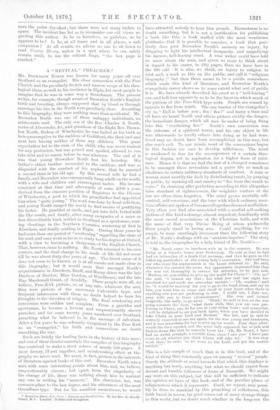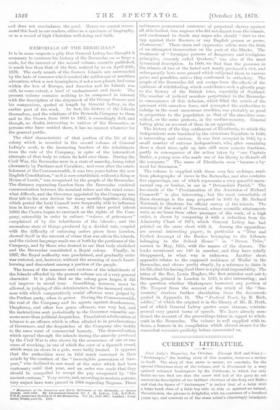A " REVIVAL " PREACHER.*
MR. BROWNLOW NORTH was known for many years all over Scotland as an evangelist. His close connection with the Free Church and the peculiarly Scotch and narrow range of his theo- logical ideas, as well as his residence in Elgin, led most people to imagine that he was in some way a Scotehman. The present writer, for example, though aware of Brownlow North's English birth and breeding, 'dryer supposed that by blood or through marriage his ties in the North were peculiarly close. According to this biography, they were nothing more than accidental. Mr. Brownlow North was one of those unhappy individuals, an aristocratic waif. The only sou of the Rev. Charles A.. North, rector of Alverstoke, &c., and grandson of the Right Rev. Brown- low North, Bishop of Winchester, he was hailed at his birth as heir-presumptive to the earldom of Guildford, the then earl and next heir having neither of them any children. This great expectation led to the ruin of the child, who was never trained for any profession, but was petted and spoiled, allowed to run into debt and to marry before he was nineteen. The end of it was that young Brownlow North lost his heirship. His father's eldest brother succeeded to the earldom, and win; so disgusted with the conduct of his nephew, that he married u second time in his old age. By this second wife he had a family, and Brownlow was consequently flung adrift on the world, with a wife and children and extravagant tastes. His income consisted at that. time and afterwards of some £300 a year, derived from the sinecure position of Registrar to the Diocese of Winchester, a post to which his grandfather had appointed him when "quite young." The work was done by local solicitors, and young North ranged the world to find means of gratifying his tastes. He gambled at cards, and got into debt, betted with the like result, and finally, after many escapades of a more or less discreditable kind, settled in Scotland as a sportsman, rent- ing shootings in the Northern Counties, wintering at first in Aberdeen, and finally settling in Elgin. During these years he had more than one period of
"awakening" regarding the state of his soul, and once went so far as to study for his degree at Oxford, with a view to becoming a clergyman of the English Church. That, however, came to nothing. Mr. North returned to his own courses, and the final change in his mode of life did not occur till he was about forty-five years of age. The direct cause of it does not seem to be known, or 18 at all events not made clear in this biography ; but it would seem that amongst North's acquaintances in Aberdeen, Banff, and Moray shires was the late Duchess of Gordon, Miss Gordon, of Wardhouse, and the late Hay MacdowallG rant, of Arndilly. These people were all, we believe, Free-Kirk pietists, or, at any rate, whatever the sect, they were pietists of the narrowest Calvinistic type, and frequent intercourse with them no doubt helped to turn his thoughts in the direction of religion. His final awakening and conversion were sudden and complete. From a gambler and sportsman, he became a fervent and unquestionably sincere some twenty years wandered over Scotland, preacher, and for preaching what he believed to be the message of salvation. After a few years he was solemnly recognised by the Free Kirk us an "evangelist," his birth and connections no doubt smoothing the way.
Such are briefly the leading facts in the history of this man ; and out of these slender materials the compiler of this biography has contrived to make a stout octavo of nearly 500 pages. A more dreary, ill-put together, and uninteresting effort at bio- graphy we never read. We must, in fact, protest in the interests of literature against books of this sort. Browulow North was a man with some interesting points about him, and, we believe, unquestionably sincere ; but apart from the singularity of his change of life, there was nothing about him to warrant any one in writing his "memoir." His character, too, was common-place to the last degree, and his utterances of the most threadbare type. But for his manifest earnestness, he would
* Pr oirnIcto North, fl. . an-H.; Record,' nrul Reconcelforrs. By the Rev, K. Moody- Stuart, M.A. Loudon : liodder sod Stoughton,
have attracted nobody to hear him .preach. Earnestness is no doubt something, but it is not a justification for publishing a book like this, a book stuffed with the most wearisome platitudes that it is possible to conceive, a book that posi- tively does poor Brownlow North's memory an injury, by dragging to light his intellectual incapacity, and magnifying his narrow, hell-fearing creed. A wise writer could have told us more about the man, and given us more to think about in regard to his career, in fifty pages, than we have here in the 480 odd. It is also, we think, an injury to religion to foist such a work as this on the public, and call it "religious biography ;" but then there seems to be a public somewhere which rends this kind of literature, and Brownlow North's evangelistic career shows us to some extent what sort of public it is. We have already described his creed as a " hell-fearing " one, and hell-fear appears to us to be the basis on which much of the pietism of the Free-Kirk type rests. People are roused by appeals to flee from wrath. The one burden of the evangelist's cry is, "1-Jell is before you ; flee ! flee !" and many a time and oft have we heard North and others picture vividly the danger, the immediate danger, which all men lie under of being flung into this " everlasting fire." North's own conversion was the outcome of a spiritual terror, and his one object in life was afterwards to terrify others into doing as he had done.
Good may no doubt have been accomplished in this way, but also much evil. To our minds, most of the conversions begun in this fashion are sure to develop selfishness. The mind is awakened to fear for the consequences of a certain theo-
logical dogma, not to aspiration for a higher form of exist- ence. Hence it is that we find the test of a changed conscience to be amongst these revivalists not a purer life so much as
obedience to certain arbitrary standards of conduct. A man or woman must mortify the flesh by distributing tracts, by praying
in public, by warning all and sundry to "flee from the wrath to come." In straining after perfection according to this altogether false standard of righteousness, the weightier matters of the law are often clean forgotten. The mind grows morbidly self- centred, self-conscious, and the tone with which ordinary mun- dane affairs are spoken of becomes altogether diseased and hollow. Very often you find also associated with a morbid self-seeking pietism of this kind a strange, almost impudent, familiarity with
the most sacred associations of the Christian faith, and with the name of that very Divine Being of whom professedly these people stand in loving awe. Could anything, for ex- ample, be more startlingly irreverent than the following story of Mr. North's dealings with an "anxious inquirer." The story is told to the biographer by a lady friend of Mr. North's :—
"Mr. North come to luncheon with us in the country. He was living at a friend's house near Scotscrnig. He told us that he had had an intimation of a death that morning, and then be gave us the following particulars of this young lady's conversion. She had been one who came for conversation at the house referred to. He said, whenever she entered the room, her appearance impressed him that, she was not thoroughly in earnest for salvation, so ho just said, Madam, are you willing to give up the world for Christ Oh, no!' she said, '1 vcnnnot, say that ; but what you said lag night hos troubled me and made me somewhat anxious.'—' Oh, madam!' said he, 'it would be mockery for you to go to the Lord Jesus, and say to him, you wont him to come and dwell in your heart when there is anything else you ore preferring to him. I could not, I dare not, pray with you in these circumstances.' She, rose and turned
haughtily, but sadly, to go away. he said to her, as she was
going towards the door, 'what these idols, that you are now pre- ferring to Christ, can do for you at your dying hour ; and remember, I will be delighted to see you back again, when you have decided to take Christ as your Lord and Saviour.' She left, and he said he scarcely expected to see her again., for she was young and handsome, and it was something for her to give up the world. Four days after- wards the door opened, and the same lady appeared, but so pale and broken-down like that he scarcely know her. `Oh, Mr. North, I have had an awful struggle, a terrible time, since I saw you! I have just come to ask whether you think Christ will take me.' 'It was easy work then,' he said ; 'so we went to the Lord, and got the matter settled.'"
This is a fair sample of much that is in this book, and of the kind of thing that constantly goes on among "revival" people. Surely the attitude of mind towards God which this displays is anything but lowly, anything but what we should expect from
devout and humble followers of Jesus of Nazareth. We might say more on this subject, but this will be sufficient to indicate
the opinion we have of this book, and of the peculiar phase of religiousness which it represents. Good, we repeat, may possi- bly be done to mankind by this preaching of selfishuese, this faith based in terror, for good comes out of many strange things in this world, but we doubt much whether in the long-run the evil dines not overbalance the good. Hence we cannot recom- mend this book to our readers, either as a specimen of biography, or as a record of high Christian well-doing and faith.



































 Previous page
Previous page